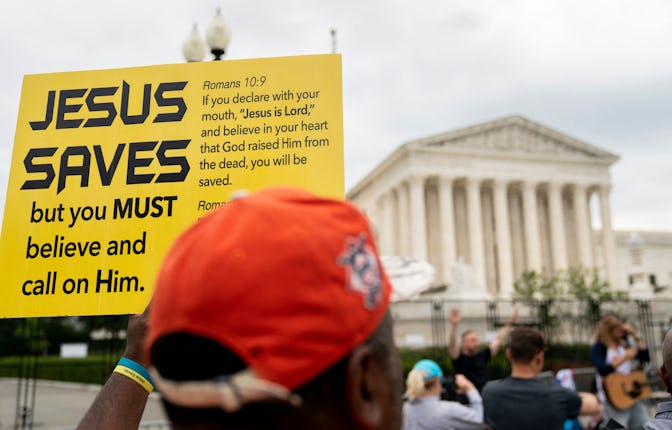This Supreme Court has a clear agenda: Christian theocracy
Across more than one ruling this term, the conservative justices have prioritized Christian expression above all else.

To the extent that we have a future to speak of, historians in that upcoming era will undoubtedly look back at the past few weeks of Supreme Court rulings and rightfully deem this stretch as the most significant lurch toward overt American theocracy in the modern era. While much of the public’s attention has (rightly) been laser focused on the revocation of the federal right to reproductive health care, this court — one whose conservative majority was installed almost entirely by presidents who lost the popular vote — has gone well beyond simply denying the personhood of pregnant people. As evidenced by looking at this terms’ rulings en masse, it’s clear this panel is committed to the longstanding right-wing enterprise of Christian minority rule in this country.
Consider, for instance, Monday’s ruling in favor of a football coach at a public high school, who was fired for holding prayer sessions during games — ones which, while not officially mandatory for students, were nevertheless understood by some players to be a de facto requirement. As the Court’s ultra-conservative majority claimed, this pressure by a public high school employee for students to engage in Christian prayer is a constitutionally protected right via the First Amendment.
However in their dissenting opinion, authored by Justice Sonia Sotomayor, the Court’s three liberal justices framed the issue thusly:
Properly understood, this case is not about the limits on an individual’s ability to engage in private prayer at work. This case is about whether a school district is required to allow one of its employees to incorporate a public, communicative display of the employee’s personal religious beliefs into a school event, where that display is recognizable as part of a longstanding practice of the employee ministering religion to students as the public watched.
Yet now, the official law of the land is that, yes, districts are legally obligated to allow employees to inject their personal religious expression into official school events, no matter if it’s well understood that these expressions are overtly coercive and proselytizing.
This ruling, taken alone, is an alarming affirmation of the country’s tolerance for — and now endorsement of — Christianity in ostensibly secular spaces. It’s hard to the point of laughability to imagine a similar ruling if, for instance, a Jewish or Muslim teacher had made students feel obligated to participate in the public recitation of the shema or the adhan.
Monday’s decision did not occur in a vacuum, however. Instead, it came at the heels of a separate — and seemingly counterfactual — ruling by the court last week, which said that the state of Maine is obligated to use public funds to cover tuition at expressly religious (and again, Christian) schools. To quote Sotomayor’s concurring dissenting opinion: “This Court continues to dismantle the wall of separation between church and state that the Framers fought to build.”
As the pair of rulings shows, that wall of separation is being dismantled now from both sides — turning secular spaces into religious ones, while simultaneously forcing the government to fund religious spaces with public money. With this full-fledged push to expand and protect these expressly Christian instances of religious dominance in the public sphere, the Court’s ruling in Dobbs v. Jackson Women’s Health to end the protections afforded by Roe v. Wade can and should be seen as merely another extension of that same endeavor; it is unambiguously framed in Christian terms at the expense of other faith traditions’ own requirements surrounding abortion. And by adhering to that framing, the Dobbs ruling expressly denies other religions their rights. The extent that other faiths are protected under these rulings and this court is almost an incidental after-effect — it’s obviously not what the six hard-right justices are actually hoping to accomplish.
This is what the U.S. Supreme Court has become: another arm of the long standing right-wing effort to install permanent minority (Christian, largely white) rule no matter the collateral damage experienced by anyone else. The sooner the public comes to understand and voice this fundamental truth, the sooner political leaders will be forced — if they ever are — to actually do something about it.